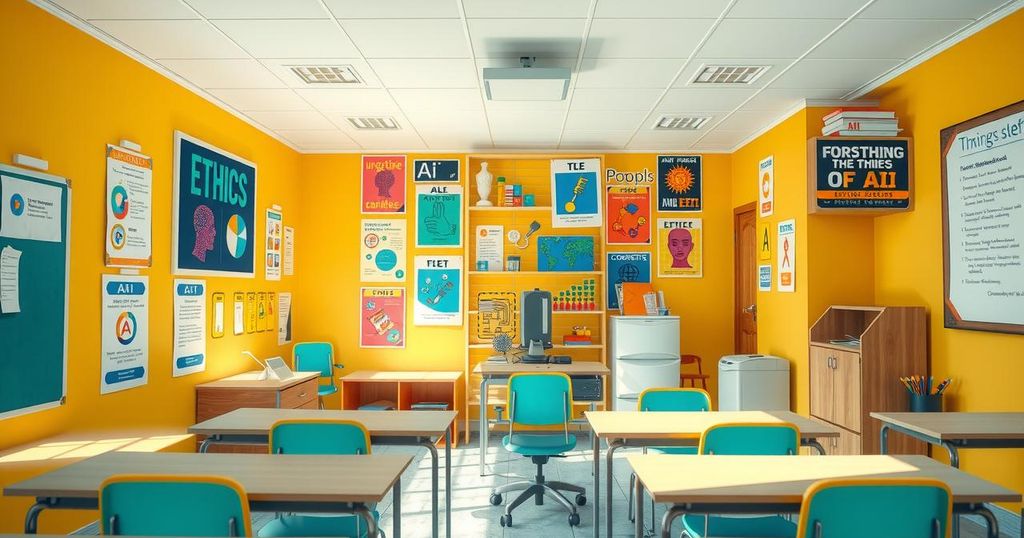Navigating the AI Landscape in Education: Opportunities and Concerns
This year, a class unit on AI ethics sparked discussions about students’ own use of AI for studying. While AI has proven helpful in lesson planning, its role raises questions about authenticity and the human connection in education. Concerns abound regarding its impact on learning depth, and experts like Tyler Cowan advocate for thoughtful adaptation in teaching as we embrace AI’s growing presence.
This past academic year, we ventured into a unit dedicated to the ethics of artificial intelligence within the classroom. Initially, I inquired whether students had any hands-on experience with AI, and a handful of them had. They shared how they utilized it to summarize key concepts like Wilson’s Fourteen Points or tackle tricky math and physics problems. It kicked off an engaging dialogue on the morality and potential implications of employing such technology in education.
To add a layer of irony to our discussions, I generated our lesson plan with an AI tool myself. It helped me craft a neat slideshow about using AI in an ethical manner. We even produced eye-catching posters that adorned our classroom, which allowed students to showcase their thoughts and findings. One student mentioned his parents, both educators, also tapped into AI to prepare for their classes.
I can attest that I’ve used AI to draft at least one unit lesson plan too, and the experience was surprisingly positive. I fed it certain elements and concepts to work with, and the final product met my expectations. However, I didn’t keep applying that method, perhaps feeling there’s just a touch too much reliance on it.
Recently, a college student lodged a complaint against her school, demanding a tuition refund. Her contention? A professor generated class lessons using AI, which she argues stripped away the personal connection and human touch she sought, emphasizing the need for genuine interactions based on knowledge and engagement. It placed a spotlight on how technology can sometimes create emotional distances in learning environments.
On one occasion, I discreetly pulled aside a student, asking if AI had inked his assignment’s content. Being an affable, smart kid, he admitted that AI had “helped.” I asked him to steer clear of that in the future, to which he nodded in agreement. By the end of the term, we shook hands, but the reality is I’ve encountered more submissions where attribution to AI was absent. Essentially, kids likely copied sections from online assignments and had AI summarize for them, resulting in familiar phrases popping up here and there.
A significant concern looms in education regarding authenticity. When you truly want to gauge someone’s understanding of a subject, chatting with them for a while reveals so much. The International Baccalaureate curriculum includes personal oral exams, a process that’s quite costly and time-consuming. In contrast, AI offers a quick, affordable way to handle documentation and planning, bringing a balance between cost and efficiency.
Interestingly, though, students’ experiences vary. Some tap into AI effectively, going deep into their learning, while others merely skim the surface, often leading them to a fleeting grasp of the material. Some might argue that’s just how education has been, even before AI entered the picture.
AI’s reliability can be a mixed bag; we often refer to erroneous outputs as “hallucinations.” Just recently, publications like the Chicago Sun-Times produced completely fictitious reading guides supposedly representing books that don’t even exist. Written by AI, they were plausible yet entirely fabricated, as if the machine was spinning tales in a burst of inspiration that can easily mislead.
The nuances get especially complicated. While AI can possess certain advantages, it raises fears over losing human elements like authenticity and empathy. On a more positive note, Tyler Cowan, an economist from George Mason University, shared how he’s been leveraging AI to provide feedback to his PhD students, sometimes yielding sharper insights than he could offer himself.
Cowan urges educators to adapt to these AI developments, suggesting innovative strategies like boot camps for faculty, reverse mentoring, and placing advanced AI on dissertation committees. His perspective hints at the notion that AI, while transformative, will alter the very fabric of our humanity, nudging us towards richer social interactions and a focus on our tangible surroundings.
Personally, I haven’t taken a firm stance on AI yet. In future pieces, I plan to dig deeper, exploring the optimism around technology and juxtaposing it with its potential pitfalls. Amid the chaos of innovation, the conversation about what it means to be human will undoubtedly continue to unfold.
The exploration of AI in education raises pressing concerns about authenticity and the quality of learning experiences. While it offers time-saving advantages and can enhance learning for some, it also risks fostering superficial understanding in others. The balance between embracing AI and retaining human qualities remains a key discussion point, as voices like Tyler Cowan encourage thoughtful adaptation among educators. As we navigate this evolving landscape, it’s crucial to understand where AI fits within our educational values and practices.
Original Source: www.news-journal.com




Post Comment